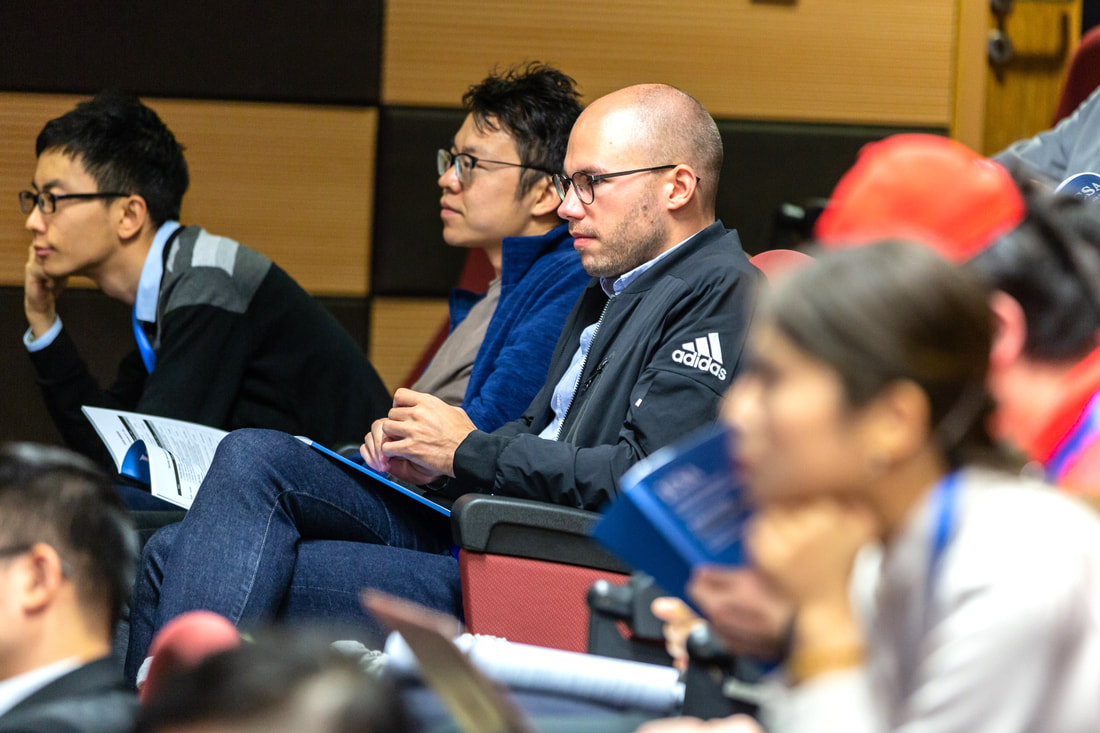|
‘You can never really know someone completely. That’s why it’s the most terrifying thing in the world, really – taking someone on faith, hoping they’ll take you on faith too. It’s such a precarious balance. It’s a wonder we do it at all.’ (Libba Bray) There’s an idea in Gestalt psychology that we’re predisposed, hard-wired, to ‘fill in the gaps’. Here’s a real and practical example. I was once invited to facilitate a conference of around 50 people from diverse professional backgrounds in the housing sector. I had never met anyone in the group and they had never met me. I stood up on the podium, introduced myself simply as ‘Nick Wright, an organisation development consultant from England’, then invited everyone to take a pen and paper. I explained that I would ask them a series of questions about myself, to which they were to guess the answers. ‘Which newspaper do I read?’ ‘What political party will I vote for at the next General Election?’ ‘Am I married, or single?’ ‘What is my professional background?’ ‘What’s my favourite hobby outside of work?’ I then asked who had been able to answer every question. Everyone raised their hands. I now invited them to draw a simple face against each of their answers – which they wouldn’t be expected to share in the group. A happy face meant their answer drew them towards me; an unhappy face that it pushed me away. A neutral face meant, well, neutral. Again, everyone managed to do it. I paused and invited them to reflect at their tables on what had just happened. Person after person said how astonished they felt at how quickly and easily they had created a profile of me in their minds, and how that had influenced how they felt about – and were now likely to respond and relate to – me. They had filled in the gaps of not-knowing by drawing on hopes and fears, past experiences, personal projections, cultural assumptions etc. Filling in the gaps enables us to relate quickly to others rather than starting every relationship as if from scratch. It also risks unhelpful stereotyping and bias. This raised important questions for participants at the conference so I offered 3 principles: compassion, curiosity and challenge. Compassion: ‘What do I need to feel safe to contribute in this group? ‘How can I demonstrate a compassionate stance towards others?’ Curiosity: ‘What assumptions am I making about those around me, e.g. based on their looks, accent or job title?’ ‘Who or what is influencing the ways in which I’m thinking about, feeling about and responding to others?’ Challenge: ‘What am I not-noticing about those around me?’ ‘How open am I to have my beliefs about others tested?’
12 Comments
‘Life is like the harp string. If it is strung too tight it won't play, if it is too loose it hangs. The tension that produces the beautiful sound lies in the middle.’ (Gautama Buddha) In World War 2, when faced with a critical decision on how to respond to the Nazi threat, one of Winston Churchill’s advisers argued forcefully that ‘organisation is the enemy of improvisation’. This wasn’t a diatribe against the power of organisation per se. It was, however, deeply rooted in a belief that the UK’s main chance of success would be to act in ways that would capitalise on its own agile cultural traits – and leave the highly-organised German war machine disorientated and defeated. I’ve noticed there are parallels in learning a second language too. Students are often taught in highly-organised ways – focusing on vocabulary, grammar, reading and writing. It can provide them with a useful foundation, yet can also leave them completely paralysed in free-flow conversation. I’ve concluded that, at least in this respect, ‘Accuracy is the enemy of fluency.’ Remove the expectation to get everything right, distract from fears of making a mistake, and the words will start to flow. That said, I need to beware of unhelpful polarisation. Early in my OD career, I worked alongside an experienced HR consultant, Chris Rowe, who introduced me to a tight-loose principle. I had argued instinctively that an organisation needed to let go of its highly-organised, stifling structures and processes to become more flexible, responsive and innovative. Chris challenged me: there is a time for tight and a time for loose – and wisdom in knowing which, where, when and for whom. ‘If I had only one hour to save the world, I would spend fifty-five minutes defining the problem, and only five minutes finding the solution.’ (Albert Einstein) Action Learning is a powerful way to explore an issue, formulate a solution and enable personal agency to act and influence change. It can also be used effectively to enable a group with shared interests or concerns to work on and address an issue together. The first step in this latter approach often entails helping a group to formulate its own question or hypothesis at the outset, a bit like when conducting action research, to establish appropriate focus and boundaries. As a facilitator, we can invite the group to reflect on criteria and wider considerations as it performs this initial task. Here are some examples: a. In relation to this issue, who are they key stakeholders in the system? b. Do we have the right people in the room to address this issue? c. Is it feasible to make useful progress on the issue in the time we have available? d. Are there any ethical, intersectional, reflexive or relational issues we should pay attention to in how we do this? Sometimes, I notice that one or more participants may have an intuitive awareness, a feeling or a hunch that something is, say, anxiety-provoking, challenging or stuck in their system, yet they may struggle to articulate it. In that case, I may invite them to, for instance, draw a picture, tell a story or enact a stance to help surface whatever issues lay beneath for them. Then, we continue the process (above) to reach clarity and agreement, as a group, before we move forward. ‘How can we make the snakes feel safe?’ The power of metaphor. Last week I worked with a group of trauma-informed practice experts. We were thinking about leading and influencing change in dynamically-complex relational systems such as teams and organisations. I shared the image of a snakes-and-ladders game board as a way both of depicting the realities of such change experiences and as a way of managing expectations. Whilst playing with possible meanings for the snakes, the ladders and the game as a whole, we explored how, at times, those people or groups we may view as passive, blocking or undermining vis a vis our own plans may be acting out of anxiety. I was reminded of Richard Young’s two key questions in the organisation development (OD) arena: ‘Where's the power and how is it exercised?’ ‘Where's the anxiety and how does it manifest itself?’ In my experience, we may discover anxiety in all dimensions of human systems. Take, for instance, the leader who is feeling pressured by multiple tasks and demands and worried that the well-meaning initiative you are proposing will be the straw that breaks the camel’s back. Or the team member who is worried that the change you are advocating will increase her responsibilities and leave her feeling inadequate, deskilled or exhausted. I worked with a new senior leader who, in our monthly meetings, would ask me lots of very detailed financial questions. I found it time-consuming and stressful because, although I felt confident in managing my budget, I wasn’t used to reporting at such micro levels. Over time, I began to wonder if I might inadvertently have started to represent a snake in his system…and he in mine. At our next meeting, I asked what he would need from me to give him sufficient trust and confidence in my financial management that I wouldn’t need to report like this in subsequent months. He said: ‘If you were to report using financial language.’ I discovered that, as a Finance Director by background and accountable for my area at Executive level, my limited use of financial language had evoked anxiety in him that I may not have a grip on my team’s finances. I spoke with Finance, expanded my lexicon, reported briefly using his language at the next meeting – and we never returned to micro detail again. The principle here was to approach the person and the issue in an open spirit of curiosity, explore respective needs, identify tangible solutions, and apply them to practice. We both transformed from snakes into ladders and our relationship grew from strength to strength. ‘Without transition, a change is just a rearrangement of the furniture.’ (William Bridges) Lean forward and look into the room. Listen in carefully to the conversation. An organisation has decided to move to smaller and cheaper office premises in order to reduce its overheads. It will mean agile working: a shift to hybrid working, hot-desking and staff lockers. It appoints a change team to oversee the move, and the team notices a range of responses from staff, from passive apathy to active dissent. It faces a growing concern about what it perceives as resistance to change. It tries hard with corporate communications to let staff know what will happen when and yet is increasingly bemused and anxious about the apparent lack of buy-in. The team invites me in as an external organisation development (OD) consultant to have a conversation with staff, an open exploration of issues and how to move things forward. Here’s a glimpse and summary, following initial rapport-building and relational-contracting to ensure a felt-sense of safety and trust in the room:
The change team had focused on practical changes (physical-transactional: what happens around us) and inadvertently failed to pay attention to corresponding human transitions (psychological-emotional: what happens within us). Notice the flow of the consultant conversation: from feeling, to meaning, to need, to solution. The style is invitational, enhancing the felt-sense of choice, influence and agency. Baskets are provided. Staff re-engage. The move goes ahead smoothly. [See also: Change leadership principles; Organisations don't exist] 'Diagnosis determines intervention.'
There’s a very big difference between ‘What’s wrong with you?’ and ‘What’s happened to you?’ Jo Watson’s book, Drop the Disorder (2019) is a timely and courageous personal-professional challenge to the creeping influence of the biomedical model into social-psychological therapeutic thinking and practice. In her aptly titled article in the book, ‘There’s an intruder in our house!’, she reflects with a pained air of near-despair on this gradual, alarming and depressing diagnostic drift: ‘It wasn’t always like this. I joined a profession that held a shared belief about the nature of human emotional distress. We understood that the many forms of human suffering we witnessed – ranging from feeling low and suicidal to self-injury, hearing voices, overwhelming anxiety and dissociative experiences – were responses and reactions to what had happened in people’s lives and, in many cases, the resourceful and creative coping strategies they had developed to survive. We clearly and consistently made links between emotional distress and causal factors like poverty, racism and abuse. There was a deep, collective ‘knowing’ that social circumstances were linked directly to human suffering and this acknowledgement translated into a connection with the political arena. Yet, as I write, this work has been consumed by a biomedical monster that has crept into our house and made itself very much at home. In fact, I don’t feel this is my home anymore.’ Jo is challenging a fundamental risk of the biomedical therapeutic model, that it locates a perceived problem in an individual, irrespective of a broader context. In doing so, Jo echoes disaster management expert Marcus Oxley’s insight (in a different arena) that, if we see a pattern of symptoms in people attending an Accident & Emergency unit, it may well reveal something implicitly about conditions in that context. It’s always about the person, but it’s rarely only about the person. ‘For every complex problem there is an answer that is clear, simple and wrong.’ (H.L. Mencken) In a world that’s so often characterised by continual change, it appears that one thing that doesn’t change is our continual thirst for new acronyms. VUCA, RUPT or BANI – which best describes your view of reality? Which most helps you, or your clients, move forward to fulfil vision, values and goals, whilst navigating whom or whatever could fly in unexpectedly from left field on route? BANI, a more recent model than its predecessors, has some attractive and useful features for the current context. It acknowledges profound phenomenological dimensions of human experience, not simply the dynamics of the environmental realities we face. BANI draws attention to Brittleness, Anxiety, Non-linearity and Incomprehensibility and may provide a platform for addressing them. Brittleness recognises that those things we regard as secure can fall apart overnight. Anxiety points to associated social health risks of anxiety and depression. Non-linear means it’s hard to predict consequences of actions with certainty because influencing factors can spring up from anywhere. Incomprehensible proposes that sense-making is impossible and we can find ourselves bewildered. If that all sounds a bit abstract, think back to what you (and others) have witnessed and experienced in the past 2 years; how much of what has happened could have been known definitively in advance; what the impacts and implications have been for different people, groups and nations; how it has looked and felt; the deep questions it has raised; how clear and agreed a way forward is from here. Macro examples have included the ongoing climate emergency, the Covid19 pandemic, the plastic-in-the-oceans disaster and the migrant crisis. We’ve seen shifts in the world’s political and economic landscapes that have been, at times, so sudden and so dramatic that they’ve caused whiplash and backlash. We have felt the ripple effects in our organisations, communities and personal lives. What wisdom can BANI offer? Here are glimpses: Brittleness calls for resilience and collaboration; Anxiety: for empathy and human-spiritual relationship; Non-linearity: for adaptivity and agility; Incomprehensibility: for intuition and risk-taking. These are pointers to the kinds of qualities and capabilities we can develop for the future, with courage and humility as an underpinning stance. Do you feel dazed and confused in a BANI world? Curious to discover how I can help? Get in touch! How far can action learning (a form of small-group peer coaching) be useful in fast-paced and complex humanitarian contexts, in countries as diverse as Bangladesh, DRC, Iraq, Jordan, Malaysia, Myanmar, Somalia and Syria? What would it take to make coaching and action learning effective in these different cultural environments? These were questions I was invited to explore and test with ALNAP and ALA’s Ruth Cook during the past 18 months.
The idea was to train field-based practitioners in action learning techniques, then to mentor them as they adapted and applied them in disaster zones. Our goal was to learn from this experience too. Travel restrictions meant that workshops were all conducted online, which created its own challenges vis a vis patchy internet connectivity and access to training resources via cell phones, yet we-they persevered and the experience proved fruitful. I was particularly interested in cross-cultural dimensions and dynamics in these training groups. Workers in humanitarian crises face intense time pressures and it could have been tempting to short-cut personal introductions and press ahead with the task. In some cultures, investing in relationship and trust-building is integral to the task and, therefore, inseparable from it. We chose, therefore, to create opportunities, where possible, for participants to get to know and understand us and each other from the outset. In Western models of action learning, emphasis is often placed on posing coaching-type questions that are short, sharp and direct. If, however, we don't pay attention to relevant cultural norms including relational preamble (e.g. ‘I am pleased to be here. Thank you for the opportunity to ask this question…’) such questions can be experienced as blunt, harsh or rude. It's important, therefore, to allow for different cultural framings and expressions. We were aware that, in contexts such as the UK and USA, action learning tends to assume an egalitarian culture within a group, within which participants are and feel free to invite and pose challenging questions to one-another. In some cultures, however, where perceived authority and social status are based on e.g. age, gender or tribe as much as on formal hierarchy, careful composition of and contracting in groups are critical success factors. In some cultures, to pose a question directly to an authority figure could be perceived as insubordinate, disrespectful or even insolent. Authority figures may be expected by others always to have the ‘right’ answers and to pose a question in a group risks shaming that person, a loss of face, if they are unable to answer it. One way to avoid this issue is to invite participants to write down questions and hand them to the person first, who can then chose which to respond to. In some cultures, it would feel inappropriate for a participant to decide unilaterally on an action at the end of an action learning cycle without having first run the idea past their line-manager for approval. This may partly be indicative of where decision-making authority is held in that hierarchy. It can also signal deference to or respect for an authority figure. One way to address this would be for a participant to relate back to the group at a subsequent meeting on what actions have been agreed. When using a peer-consultancy version of action learning, in which participants are invited to offer suggestions for consideration as well as questions, particular challenges can arise. In some cultures, participants may feel compelled to accept the first suggestion that is offered, or to agree to whatever is suggested by a perceived authority figure. Again, writing down questions to offer a presenter can help to address this. When using an appreciative version of action learning, in which participants help a person to identify what personal and contextual factors contributed to the success of an initiative, there can be challenges too. In some cultures, it can turn into a praise-party, with participants wanting to affirm the presenter rather than to tease out success factors. One way to address this is to allow space for praise first, then to move onto the more structured process. In other cultures, a presenter may feel uncomfortable to comment on what they did well personally in case it sounds immodest. Two possible ways to address this are to invite the presenter to comment on what other people may have noticed about his or her contribution, thereby attributing the qualities to a third-party perspective rather than their own, or to depersonalise it as ‘This happened’ rather than ‘I did this.’ I am deeply indebted to all of the participants in this initiative who contributed so richly to our learning and ideas. What have been your experiences of coaching, training or action learning in different cultural environments? What have you learned - and what would you recommend to others? (See also Nick's: Cross-Cultural Action Learning webinar, December 2021) Running for the school bus every morning felt like hard work. I don’t know why I didn’t just get up a bit earlier but, hey, I was a teenager. I remember vividly having my attention caught by a programme on TV featuring Timothy Gallwey and his revolutionary idea of The Inner Game. I think it served as an introduction for me to the world of psychological insight. I practised his idea, focusing away from the activity itself onto something else as a distraction, and the running became smoother, easier.
Some years later, the UK’s Guardian Newspaper ran an advertisement on TV, Point of View, that challenged perspective and interpretation. It invited viewers to re-think their own ways of making meaning of events, including the implicit risks of assumptions and prejudice. I found the ad’s message simple yet profound. It was at a time when the need to question everything was already pulsating through my own mind, within a prevailing culture that seemed to question far too little. Later still, I saw a psychology experiment on TV, The Invisible Gorilla, by Christopher Chabris and Daniel Simons, designed to test selective attention. The narrator invited viewers to try the test for themselves by watching a short video clip with specific instructions to follow. She also suggested that viewers record it so that they could play it back afterwards. I dutifully followed the instructions and was so completely astonished by the results that I did play it back to check if I’d been tricked. Such influences, among others which now included my Christian faith, drew me into the professional fields of psychological coaching, training and organisation development (OD). I continue to be curious, intrigued and amazed by the dazzling weirdness, complexity and potential of people, teams, groups and organisations, and by different cultures. I hope and pray I will never lose that sense of wonder. Who or what have been the earliest or greatest influences on your life and career? ‘If you don’t know what an extrovert is thinking, it’s because you haven’t listened. If you don’t know what an introvert is thinking, it’s because you haven’t asked.’ (Richard Marshall)
Extroverts speak, introverts write. I first noticed this reality whilst studying for a masters’ degree. I enjoyed writing my dissertation immensely because it felt like an exciting journey of discovery. It was like a stream of consciousness, seeing my learning and ideas take shape as I wrote them. I didn’t know what I thought until I wrote it down. By contrast, an extrovert colleague found writing her own dissertation tedious, an administrative task to simply record what she had already talked-through. ‘Extroverts tend to think externally; they need to verbalize their thoughts to think. Thoughts are actually formed as they are verbalized. They don’t know exactly what they are going to say at first, but they know their thoughts will take shape as they speak them. That is, an extrovert will speak it to think it. By contrast, an introvert will sit quietly and ponder, mulling ideas over in her head, looking for the right word and the best description of the ideas that are taking shape.’ (Heather Hollick) Now, it’s not that extroverts can’t write well or take pleasure in it, or that introverts can’t talk or enjoy conversation. It’s more about a preference or a default. Whereas extroverts sometimes need to remember to listen, I sometimes need to remember to speak. The conversation can be so vivid, so active in my mind that I feel as if I’m engaged in the discussion out loud. I have learned over time that sometimes I need to speak earlier, before my thoughts are fully-formed, to invite others in. So, what does this mean in practice? If you’re working with an extrovert, speak to them directly and give them chance to speak, to think. Give them time to mull things over by talking out loud until they reach their own conclusions. Conversely, if you’re working with an introvert, give them quiet space to think, to write down, to form their thoughts before speaking. What’s your preference? How do you take preference into account when working with people? Do you prefer to speak or to write? |
Nick WrightI'm a psychological coach, trainer and OD consultant. Curious to discover how can I help you? Get in touch! Like what you read? Simply enter your email address below to receive regular blog updates!
|













 RSS Feed
RSS Feed